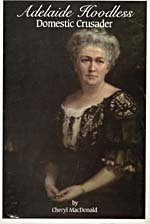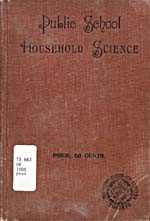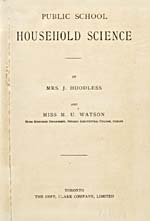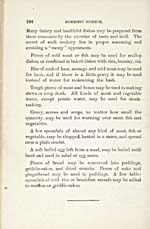Common menu bar links
Institutional links
ARCHIVED - Bon appétit!
A Celebration of Canadian Cookbooks
Archived Content
This archived Web page remains online for reference, research or recordkeeping purposes. This page will not be altered or updated. Web pages that are archived on the Internet are not subject to the Government of Canada Web Standards. As per the Communications Policy of the Government of Canada, you can request alternate formats of this page on the Contact Us page.
History of Canadian Cookbooks
Revolutions In The Kitchen
- Preface
- Adelaide Hoodless
- Science in the Kitchen
Adelaide Hoodless
Adelaide Hoodless (née Hunter), born in Canada East in 1857, became one of Canada's most significant 19th-century social reformers. She was involved in the establishment and early days of the Women's Institute, the National Council of Women, the Young Women's Christian Association (YWCA), and the Victorian Order of Nurses.
In 1889, the youngest of her four children, John Harold, died at the age of two. Adelaide was devastated to learn that his death was the result of drinking contaminated milk -- a common enough occurrence in those days. Milk was delivered door-to-door in uncovered containers at the time, and most people were still unaware of the basic rules of hygiene.
Determined that this would not happen to others, Adelaide Hoodless led a campaign for the pasteurization of milk. For the rest of her life, her spare time was devoted to improving life for women and families. She even persuaded the Hamilton school board to add "domestic science" to the curriculum, an idea that would spread throughout the country. In 1906, Lillian Massey Treble founded a household sciences faculty at the University of Toronto. It was one of the few university courses where female students were encouraged and where they could study chemistry.
Adelaide Hoodless died suddenly in 1910. "Apart from my family duties," she wrote, "the education of mothers has been my life work."

Cheryl MacDonald. Adelaide Hoodless: Domestic Crusader. Toronto: Dundurn Press, 1986
The purpose of this little book was to encourage young Canadian girls in the art of home-making and to bridge the gap between home and school through practical home economics education.







